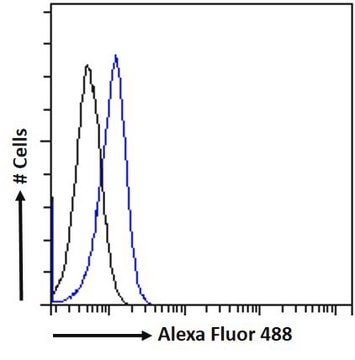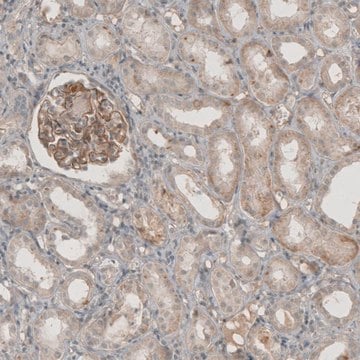SAB4200757
Anti-PLA2R1 Antibody
mouse monoclonal, 12-6-5
Synonym(s):
Anti-180 kDa secretory phospholipase A2 receptor, Anti-C-type lectin domain family 13 member C, Anti-M-type receptor, Anti-PLA2-R, Anti-PLA2R, Anti-Secretory phospholipase A2 receptor
About This Item
Recommended Products
product name
Anti-PLA2R antibody, Mouse monoclonal, clone 12-6-5, purified from hybridoma cell culture
biological source
mouse
Quality Level
antibody form
purified from hybridoma cell culture
antibody product type
primary antibodies
clone
12-6-5, monoclonal
form
buffered aqueous solution
mol wt
~180 kDa
species reactivity
human
concentration
~1 mg/mL
technique(s)
flow cytometry: suitable
immunoblotting: 1-2 μg/mL using partial recombinant human PLA2R1 protein (predicted ~150kDa)
immunofluorescence: suitable
immunohistochemistry: suitable
isotype
IgG2b
UniProt accession no.
shipped in
dry ice
storage temp.
−20°C
target post-translational modification
unmodified
Gene Information
human ... PLA2R1(22925)
General description
Immunogen
Application
- immunoblotting
- immunofluorescence
- flow Cytometry
- immunohistochemistry
Biochem/physiol Actions
Physical form
Not finding the right product?
Try our Product Selector Tool.
Storage Class Code
10 - Combustible liquids
WGK
WGK 3
Flash Point(F)
Not applicable
Flash Point(C)
Not applicable
Certificates of Analysis (COA)
Search for Certificates of Analysis (COA) by entering the products Lot/Batch Number. Lot and Batch Numbers can be found on a product’s label following the words ‘Lot’ or ‘Batch’.
Already Own This Product?
Find documentation for the products that you have recently purchased in the Document Library.
Customers Also Viewed
Our team of scientists has experience in all areas of research including Life Science, Material Science, Chemical Synthesis, Chromatography, Analytical and many others.
Contact Technical Service












